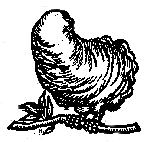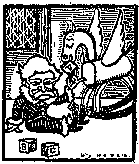September 19 Wednesday – Sam left Fairhaven, Mass. on the Kanawha for New York City. On board he read 10,000 words of Charlotte Teller Johnson’s play [Sept. 20 to Lyon].
In the evening Sam spoke at the Associated Press Dinner at the Waldorf-Astoria Hotel in N.Y.C. The NewYork Times, Sept. 20, p. 4 reported on the event:
SPELLING AND PICTURES AND TWAIN AT DINNER
The Associated Press Men Hear a Plea for Phonetic Forms.
——— ——— ———
THE SPEAKERS CARTOONED
So Were the Oysters, Who Couldn’t Object—Gen. Porter One of the Orators.

This was the introductory sketch in a series of fancy pictures (not intended as likenesses) which adorned a highly unconventional menu prepared for the annual dinner of The Associated Press in the Astor Gallery of the Waldorf-Astoria last night. It was as quaint a menu as has been seen in this city in a long time. It was in the form of a tiny book, with a cut, like those reproduced here, illustrating every item in the feast and “taking off” every orator on the list. With each illustration went a verse.
There were about 150 members present and about a dozen guests, including Gen. Horace Porter and Mark Twain, each of them being counted for statistical purposes only as one person A dozen or so women sat above the banqueters and watched them and listened to the speakers. Great American flags draped the wall in behind the stage upon which sat The Associated Press men and their guests.
The orchestra obligingly played “In the Good Old Summer Time,” which was in keeping with the temperature. All the big windows were open on the north and east, however, and the green palms helped out an illusion that it was cool. Moreover, the picture of the oyster, contemporary with “r” months and lowered temperature, was on one of the first pages of the little menu book, thus:

The bivalve is a funny bird,
For silence he’s renowned;
But I have heard an Oyster Bay,
‘Tis an odd Long Island Sound!
The dinner was scheduled to begin at 7 o’clock. By 9 o’clock it had got as far as Mousse de voiatille a la Montargis and St. Estephe, on the one hand, and Clifford Wiley, baritone, on the other. General Manager Stone of The Associated Press questioned which combination was the better. After Mr. Wiley had sung excellently the Toreador song from “Carmen,” Mr. Stone rose and requested that Mr. Wiley sing “The Song That Reached My Heart.”
Frank Lincoln, introduced as a talebearer, went along with sorbet de Fantasie, thus hymned and pictured in the menu book:

Here’s Venus rising from the sea
Without her Paris bodice;
Quick! Eat her up before she melts –
The sorbet—not the goddess.
[OTHER SPEECHES CUT HERE]
After Gen. Porter, Toastmaster Melville E. Stone rose to introduce “Mark Twain.” The diners, turning to Page 13 of the menu, found this picture and verse dealing with the gentle humorist:

His hobby was a hobby-horse
With wings of driven snow,
And everywhere that Sammy went
His hobby too would go.
The band played “For he’s a jolly good fellow” when Mr. Clemens rose, and the people at the tables took up the song.
MARK TWAIN’S SPEECH.
“I am here to make,” said Mr. Clemens, “to make an appeal to the nations in behalf of the simplified spelling. I have come here because they cannot all be reached except through you.
There are only two forces that can carry light to all the corners of the globe—only two—the sun in the heavens and the Associated Press down here. I may seem to be flattering the sun, but I do not mean it so; I am meaning only to be just and fair all around. You speak with a million voices; no one can reach so many races, so many hearts and intellects, as you—except Rudyard Kipling, and he cannot do it without your help. If the Associated Press will adopt and use our simplified forms, and thus spread them to the ends of the earth, covering the whole spacious planet with them as with a garden of flowers, our difficulties are at an end.
“Every day of the 365 the only pages of the world’s countless newspapers that are read by all the human beings and angels and devils that can read, are those pages that are built out of Associated Press dispatches. And so I beg you, I beseech you—oh, I implore you to spell them in our simplified forms. Do this daily, constantly, persistently, for three months—only three months—it is all I ask. The infallible result?—victory, victory, all down the line. For by that time all eyes here and above and below will have become adjusted to the change and in love with it, and the present clumsy and ragged forms will be grotesque to the eye and revolting to the soul. And we shall be rid of phthisis and phthisic and pneumonia, and pneumatics, and diphtheria and pterodactyl, and all those other insane words which no man addicted to the simple Christian life can try to spell and not lose some of the bloom of his piety in the demoralizing attempt. Do not doubt it. We are chameleons, and our partialities and prejudices change places with an easy and blessed facility, and we are soon wonted to the change and happy in it. We do not regret our old, yellow fangs and tushes after we have worn nice fresh uniform store teeth a while.
He Was a Scoffer.
“Do I seem to be seeking the good of the world? That is the idea. It is my public attitude; privately I am merely seeking my own profit. We all do it, but it is sound and it is virtuous, for no public interest is anything other or nobler than a massed accumulation of private interests. In 1883, when the simplified spelling movement first tried to make a noise, I was indifferent to it; more—I even irreverently scoffed at it. What I needed was an object lesson, you see. It is the only way to teach some people. Very well, I got it. At that time I was scrambling along, earning the family’s bread on magazine work at seven cents a word, compound words at single rates, just as it is in the dark present. I was the property of a magazine, a seven-cent slave under a boiler iron contract. One day there came a note from the editor requiring me to write ten pages on this revolting text: ‘Considerations concerning the alleged subterranean holophotal extemporaneousness of the conchyliaceous superimbrication of the ornithorhyncus, as foreshadowed by the unintelligibility of its plesiosaurian anisodactylous aspects.’
“Ten pages of that. Each and every word a seventeen-jointed vestibuled railroad train. Seven cents a word. I saw starvation staring the family in the face. I went to the editor, and I took a stenographer along so as to have the interview down in black and white, for no magazine editor can ever remember any part of a business talk except the part that’s got graft in it for him and the magazine. I said, ‘Read that text, Jackson, and let it go on the record; read it out loud.’ He read it: “Considerations concerning the alleged subterranean holophotal extemporaneousness of the conchyliaceous superimbrication of the ornithorhyncus as foreshadowed by the unintelligibility of its plesiosaurian anisodactylous aspects.’
“I said, ‘You want ten pages of those rumbling, great long summer thunder peals, and you expect to get them at 7 cents a peal?’
“He said, ‘A word’s a word, and seven cents is the contract; what are you going to do about it?’
“I said, ‘Jackson, this is cold-blooded oppression. What’s an average English word?’
“ He said, ‘Six letters.’
But Was Converted.
“I said, ‘Nothing of the kind; that’s French, and includes the spaces between the words; an average English word is four letters and a half. By hard honest labor I’ve dug all the large words out of my vocabulary and shaved it down until the average is three letters and a half. I can put 1,200 words on your page, and there’s not another man alive that can come within two hundred of it. My page is worth $84 to me. It takes exactly as long to fill your magazine pages with long words as it does with short ones—four hours. Now then, look at the criminal injustice of this requirement of yours. I am careful, I am economical of my time and labor. For the family’s sake I’ve got to be so. So I never write ‘metropolis’ for 7 cents, because I can get the same money for ‘city.’ I never write ‘policeman,’ because I can get the same price for ‘cop’. And so on and so on. I never write ‘valetudinarian’ at all, for not even hunger and wretchedness can humble me to the point where I will do a word like that for 7 cents; I wouldn’t do it for 15. Examine your obscene text, please; count the words.’
“He counted and said it was 24. I asked him to count the letters. He made it 203.
“I said, ‘Now, I hope you will see the whole size of your contemplated crime. With my vocabulary I would make 60 words out of those 203 letters, and get $4.20 for it; whereas for your inhuman 24 I would get only $1.68. Ten pages of these skyscrapers of yours would pay me only about $300; in my simplified vocabulary the same space and labor would pay me $840. I do not wish to work upon this scandalous job by the piece. l want to be hired by the year.’ He coldly refused. I said:
“ ‘Then for the sake of the family, if you have no feeling for me, you ought at least to allow me overtime on that word ‘extemporaneousness.’ Again he coldly refused. I seldom say a harsh word to anyone, but I was not master of myself then, and I spoke right out and called him an anisodactylous plesiosaurian conchyliaceous ornithorhyncus, and rotten to the heart with holophotal subterranean extemporaneousness. God forgive me for that wanton crime; he lived only two hours!
“From that day to this I have been a devoted and hard-working member of that heaven-born institution, the International Association for the Prevention of Cruelty to Authors, and now I am laboring with Carnegie’s Simplified Committee, and with my heart in the work.
A Real Phonetic Letter.
“Now then, let us look at this mighty question reasonably, rationally, sanely—yes, and calmly, not excitedly. What is the real function, the essential function, the supreme function, of language? Isn’t it merely to convey ideas and emotions? Certainly. Then if we can do it with words of phonetic brevity and compactness, why keep the present cumbersome forms? But can we? Yes. I hold in my hand the proof of it. Here is a letter written by a woman, right out of her heart of hearts. I think she never saw a spelling book in her life. The spelling is her own. There isn’t a waste letter in it anywhere: It reduces the phonetics to the last gasp—it squeezes the surplusage out of every word—there’s no spelling that can begin with it on this planet outside of the White House. And as for the punctuation, there isn’t any. It is all one sentence, eagerly and breathlessly uttered, without break or pause in it anywhere. The letter is absolutely genuine —I have the proofs of that in my possession. I can’t stop to spell the words for you, but you can take the letter presently and comfort your eyes with it.”
Mr. Clemens then read the letter which was:
“Miss _____ dear freind i took some Close into the armerry and give them to you to Send too the suffrers out to California and i Hate to truble you but i got to have one of them Back it was a black oll woole Shevyott With a jacket to Mach trimed Kind of Fancy no 38 Burst measure and passy menterry acrost the front And the color i woodent Trubble you but it belonged to my brothers wife and she is Mad about It i thoght she was willin but she want she says she want done with it and she was going to Wear it a Spell longer she ant so free harted as what i am and she Has got more to do with Than i have having a Husband to Work and slave For her i gess you remember Me i am shot and stout and light complected i torked with you quite a spell about the suffrars and said it was orful about that erth quake i shoodent wondar if they had another one rite off seeine general Condision of the country is Kind of Explossive i hate to take that Black dress away from the suffrars but i will hunt round And see if i can get another One if i can i will call to the armerry for it if you will jest lay it asside so no more at present from your True freind i liked your appearance very Much.”
“Now you see,” said Mr. Clemens, “what simplified spelling can do. It can convey any fact you need to convey; and it can pour out emotions like a spellbinder. I beg you, I beseech you, to adopt our spelling, and print all your dispatches in it.
Twain’s Serious Word.
“Now, I wish to say just one entirely serious word:
“I have reached a time of life, seventy years and a half, where none of the concerns of this world have much interest for me personally. I think I can speak dispassionately upon this matter, because, in the little while that I have got to remain here I can get along very well with these old-fashioned forms, and I don’t propose to make any trouble about it at all. I shall soon be where they won’t care how I spell so long as I keep the Sabbath. [Laughter]
There are 82,000,000 of us people that use this orthography, and it ought to be simplified in our behalf, but it is kept in its present condition to satisfy 1,000,000 people who like to have their literature in the old form. That looks to me to be rather selfish, and we keep the forms as they are while we have got 1,000,000 people coming in here from foreign countries every month and they have got to struggle with this orthography of ours, and it keeps them back and damages their citizenship for years until they learn to spell the language, if they ever do learn. This is merely sentimental argument.
No Real Argument.
“People say it is the spelling of Chaucer and Spenser and Shakespeare and a lot of other people who did not know how to spell anyway, and it has been transmitted to us and we preserved it and wish to continue to preserve it because of its ancient and hallowed associations.
“Now, I don’t see that there is any real argument about that. If that argument is good, then it would be a good argument not to banish the flies and the cockroaches from hospitals because they have been there so long that the patients have got used to them and they feel a tenderness for them on account of the associations. Why, it is like preserving a cancer in a family because it is a family cancer, and we are bound to it by the test of affection and reverence and old mouldy antiquity.
“I think that this declaration to improve this orthography of ours is our family cancer, and I wish we could reconcile ourselves to have it cut out and let the family cancer go.
“Now, you see before you the wreck and ruin of what was once a young person like yourselves. I am exhausted by the heat of the day. I must take what is left of the wreck and ruin out of your presence and carry it away to my home and spread it out there and sleep the sleep of the righteous. There is nothing much left of me but my age and my righteousness, but I leave with you my love and my blessing, and may you always keep your youth.” [Prolonged applause.]
Isabel Lyon’s journal: “I’m not well these days. I seem to be exhausted.
The King speaks in N.Y. tonight at a big banquet of the Associated Press. Melville E. Stone at the head of it all, and the King’s speech will lead along to spelling reform” [MTP TS 121]
John M. Howells wrote to Isabel Lyon c/o Sam. “Thank you for your note of Sept’r 16th. / I regret extremely that Miss Clemens should have been troubled in any way with the matter of the Redding house while she is so busy. / Please tell Mr. Clemens, as to the cost of $25,000. or $30,000., or in fact, any price he decides on, it is quite possible to design a house for that sum” [MTP]. Note: Howells (1868-1959), son of William Dean Howells, was an award-winning architect Sam hired in 1906 to design “Stormfield.” John had studied architecture at Ecole des Beaux Arts in Paris.